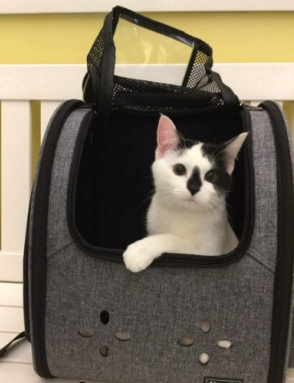Vaccines and Sarcomas
Those of us entrusted with caring for cats have basic desires: first, we wish to help cats by preventing serious diseases and death; second, we wish to keep them free from harm. Achieving both objectives at the same time seems simple enough. Unfortunately, few medical procedures are totally without risk, and sometimes procedures that are normally helpful can cause harm. The association between vaccine administration and sarcomas (specific kinds of cancer) is an example.
Is this something new?
Sarcomas are not new forms of cancer in cats, but in 1991, veterinarians began to notice a higher than expected number of sarcomas occurring on cats’ bodies in places where vaccines are commonly injected. Subsequently, an association between vaccine administration and sarcoma development was established.
Luckily the risk of sarcoma is only 1 in 5,000-10,000 cats. In fact, we have yet to see a case of the disease at Best Friends Veterinary Center. Most feline sarcomas are not associated with vaccines in any way – and those that are associated occur infrequently – yet veterinarians are deeply concerned. Several strategies have been developed over the last 30 years to help reduce the risk of vaccinations in our feline patients.

Strategies for reducing risk from vaccination administration:
What if a lump is detected?
If you detect a lump, and it remains or keeps growing, contact us as soon as possible. Small samples of the lump will be sent to a laboratory for diagnosis if any of the following are true:
- The lump persists for more than three months after vaccination.
- It is larger than two centimeters in diameter (about the size of an olive).
- It is increasing in size one month after the vaccination. If the lump is found
to be a sarcoma, we may confer with or refer you to a veterinary oncologist (a cancer specialist) for management.
If vaccines are causing problems, why use them at all?
We are concerned that cat owners, attempting to keep their cats from harm, may forego vaccination entirely. Though well intentioned, these owners may be placing their cats at far greater risk of acquiring a fatal infection than any risk the vaccine poses. And in the case of rabies, human health is at risk as well. In the vast majority of situations, vaccines are much more beneficial than harmful, as they protect cats from serious infection and disease.
We also worry that if a vaccine isn’t due, cat owners won’t bring their pets in at all. Regardless of which vaccinations are given and when, we want to be sure all our feline patients continue to receive physical exams. This is our opportunity to discover physical problems such as dental disease, to discuss nutrition and parasite control, to do laboratory screening and to inform pet owners of new products and services available for their pets.
Pets who visit a veterinarian regularly live several years longer than cats who don’t. Pets who are vaccinated also live longer. We will keep you up to date with the latest research in vaccine safety so, together, we can take the best possible care of your furry family members.
“In the vast majority of situations, vaccines are much more beneficial than harmful, as they protect cats from serious infection and disease.”
